 Petzlover
Petzlover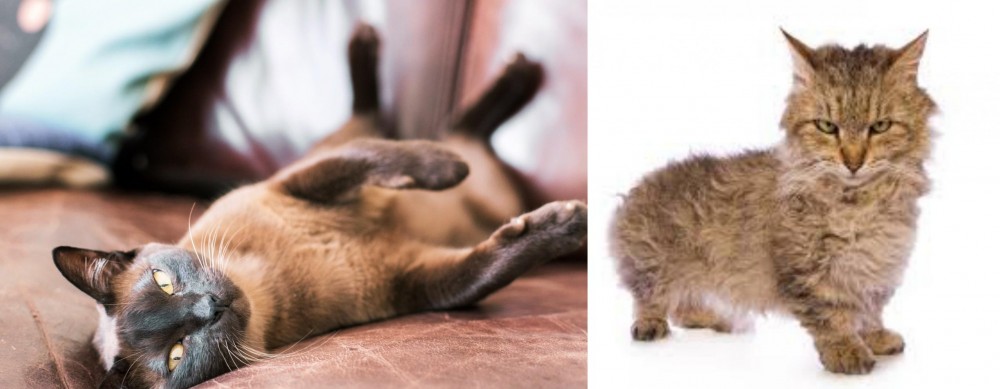 Both Burmese and Skookum are originated from United States. Both Burmese and Skookum are having almost same weight. Both Burmese and Skookum has almost same life span. Both Burmese and Skookum has almost same litter size. Both Burmese and Skookum requires Low Maintenance.
Both Burmese and Skookum are originated from United States. Both Burmese and Skookum are having almost same weight. Both Burmese and Skookum has almost same life span. Both Burmese and Skookum has almost same litter size. Both Burmese and Skookum requires Low Maintenance.
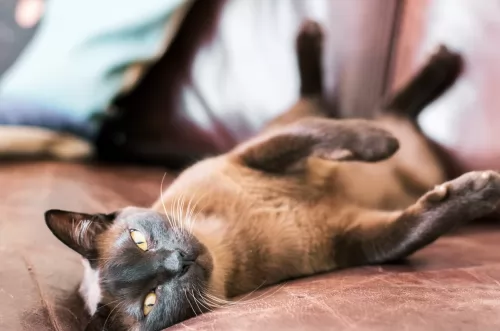 A dark brown cat together with Dr Joseph C. Thompson made their way from Burma to the United States in 1930. Cat fanciers believed that it was a dark-colored Siamese.
A dark brown cat together with Dr Joseph C. Thompson made their way from Burma to the United States in 1930. Cat fanciers believed that it was a dark-colored Siamese.
Dr. Thompson along with other breeders decided to breed the cat and she was the start of the Burmese breed.
Hybrids however, began appearing in the show hall in 1947. This was considered a violation of the show rules of the Cat Fanciers' Association and recognition of the Burmese was withdrawn until 1953. The Burmese Cat Society of America then had to give assurance to the registries that this type of thing would not happen again.
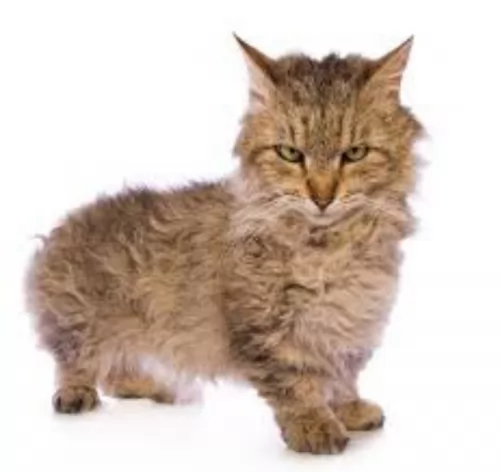 Skookums are a new cat breed – an experimental and rare hybrid dwarf cat breed, It was developed in the United States in the 1990s.
Skookums are a new cat breed – an experimental and rare hybrid dwarf cat breed, It was developed in the United States in the 1990s.
As a new breed, you’re not going to find too much information on their history, but is was breeder Roy Galusha who started crossing the Munchkin cat with the LaPerm.
Even today, some years later, the Skookum cat is still an experimental cat breed that is considered a rare dwarf breed. It is recognized as an Experimental breed by Independent European Registries as well as the Dwarf Cat Association.
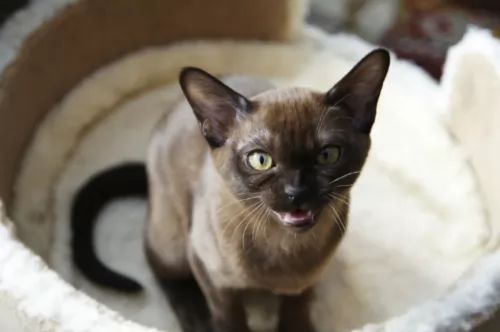 The Burmese is a medium-sized cat - fairly stocky and solid and weighs between 3 and 5kg.
The Burmese is a medium-sized cat - fairly stocky and solid and weighs between 3 and 5kg.
The dense, short coat of the Burmese comes in a variety of colors such as chocolate, cream, sable, red, tortoishell and solid colors too. The color you are most likely to see is sable.
It’s a low shedding cat so his grooming needs are low. The eyes, often a beautiful yellow shade, can be in different shades of yellow really.
Your gorgeous Burmese cat is a curious cat and finds exploring new places a huge adventure. They’re prepared to get on with some other pets in the home, but they may not be happy to welcome all cat breeds. The Burmese don't particularly like sharing their home and his human family with other cats in the home and love to get all the attention for themselves.
Once these cats mature, they do tend to settle down quite a bit and become placid, being a spectator to fun activities rather than a participant.
Still, they love their humans and are more than happy to find a place in the sun and to watch everyone from there.
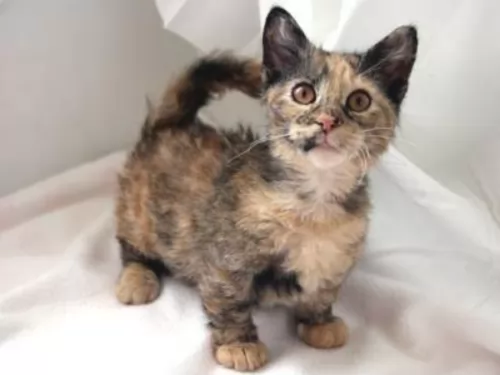 The dwarf Skookum only weighs between 2 and 3kg. It is a new cat breed with a curly coat. The coat can be in a range of colors and patterns.
The dwarf Skookum only weighs between 2 and 3kg. It is a new cat breed with a curly coat. The coat can be in a range of colors and patterns.
It is a small, lightweight cat with short legs and a broad head and stocky build. It has a muscular build. The eyes are large and walnut- shaped while the ears are large and pointed.
The neck is also thickish. The coat is soft and curly, standing away from the body and spiraling into ringlets. It can feature a number of colors and patterns such as solid, bicolor, and colorpoint. These cats can be long-haired or short-haired.
They are playful cats, full of energy and they love climbing and jumping. They’re intelligent, confident cats and are also loyal and loving towards their human family. They may be active, playful cats, but they still like to settle down into your lap.
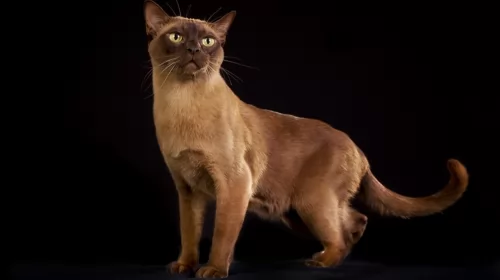 The Burmese cat loves to climb and survey his world from a high perch so don’t forget to invest in some kind of climbing apparatus or cat tree for him.
The Burmese cat loves to climb and survey his world from a high perch so don’t forget to invest in some kind of climbing apparatus or cat tree for him.
He tends to become a bit inactive as he gets older and this can be a problem and lead to obesity. Encourage your Burmese cat to come out and play to make sure he gets enough exercise.
He loves being noticed by his human family and will thrive on being petted and noticed, and of course, you’ll want to, as a Burmese has got a whole love of loving to give you too.
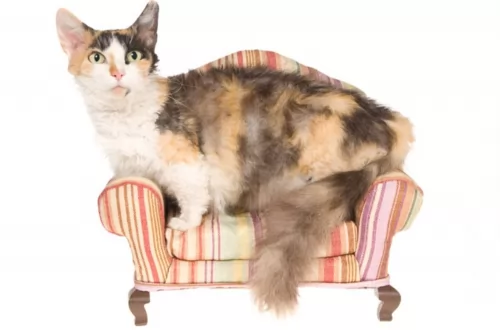 Because the Skookum cat is still in its early stages of development if you want to know precisely what the characteristics of the cat are you would want to look at the Munchkin and the LaPerm cat.
Because the Skookum cat is still in its early stages of development if you want to know precisely what the characteristics of the cat are you would want to look at the Munchkin and the LaPerm cat.
One thing is sure the Skookum cat thrives on the attention of his human family and if you provide him with the love and attention he craves, you can be sure that he will turn out to be the right friend and companion for your family.
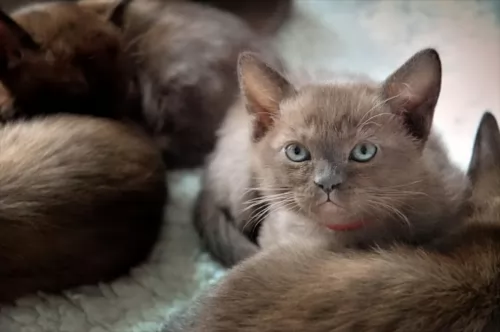 These cats are a healthy breed and if you take good care of your Burmese he can live to up to 13, 14 or 15 years of age.
These cats are a healthy breed and if you take good care of your Burmese he can live to up to 13, 14 or 15 years of age.
But you have to be aware of diabetes mellitus as well as something known as hypokalaemic polymyopathy – muscle weakness because of low blood potassium levels.
You’ve also got to look out for obesity as these are sturdy, stocky cats and overeating can lead to obesity and a host of health issues such as painful joints and diabetes.
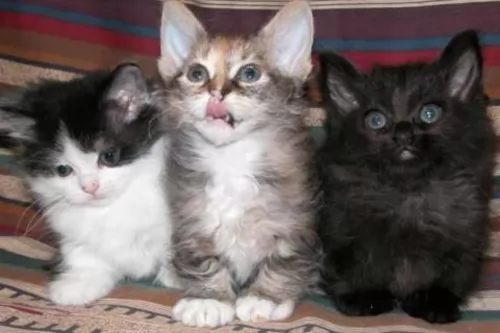 Because the Skookum cat is a new, experimental breed, health problems with the cat are not well known. However, every cat can succumb to some of the common cat health issues there are. As a pet owner you want to watch for and recognize signs that your cat’s health is in trouble.
Because the Skookum cat is a new, experimental breed, health problems with the cat are not well known. However, every cat can succumb to some of the common cat health issues there are. As a pet owner you want to watch for and recognize signs that your cat’s health is in trouble.
Feline leukemia for instance is a disease that spreads through bodily fluids such as urine, saliva and nose discharge, and saliva. Mother cats can even pass the disease along to her kittens. Feline leukemia can also lead to a host of conditions such as diarrhea, respiratory tract infections, skin problems and eye diseases among others.
Feline panleukopenia is known to most people as feline distemper and it is a very contagious viral disease with kittens being most at risk.
The disease affects a cat's immune system and the cat will likely have diarrhea, vomiting and dehydration, and lethargy. It’s a deadly disease that requires a vaccine to prevent it.
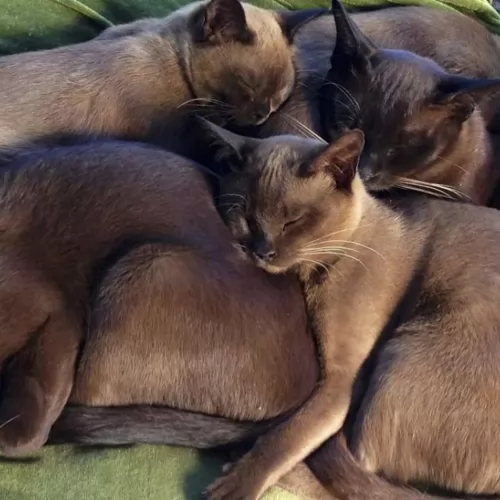 Burmese cats are naturally good climbers and you will need to provide these cats with some kind of climbing tree or something else where they can climb and perch.
Burmese cats are naturally good climbers and you will need to provide these cats with some kind of climbing tree or something else where they can climb and perch.
While adult Burmese cats tend to be fairly placid cats, they still love to play and love the interaction between themselves and their humans. As he gets older, don’t forget to keep up a regular playtime with him.
Shedding is minimal with the Burmese cat and weekly brushing will be a good bonding session and also keep your Burmese cat’s coat healthy and shiny by removing dust and loose hair.
Your fur child requires the best – a balanced cat food packed with protein to support him in all his activities and to ensure he maintains a good weight.
There are many excellent commercially manufactured cat foods on the market so learn to understand the ingredients and what nutrients are required.
Certainly, your Burmese kitten will require a complete and balanced kitten food with all the right nutrients to ensure good bone and coat growth. Then it is time to choose a kitten food which will later change to adult food as your kitten matures.
There are excellent cat foods for every stage and season of your cat’s life and from top brands – people who know the needs of cats.
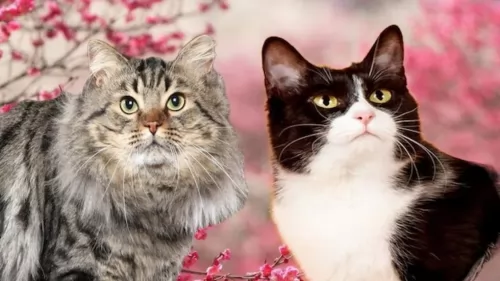 Even though the Skookum has curly hair, it’s not difficult to groom him. You want to brush the soft curls gently once a week. Keep it gentle so that you don’t make the curls frizzy.
Even though the Skookum has curly hair, it’s not difficult to groom him. You want to brush the soft curls gently once a week. Keep it gentle so that you don’t make the curls frizzy.
Use some warm water in a spray bottle with some pet conditioner and spray the curls lightly and use your fingers to liven up the curls.
Cats like to nibble throughout the day and it is better for them to feed like this as opposed to a larger meal morning and night.
However, you will need to know what your cat is eating as you don’t want to overfeed your cat. Obesity comes with a host of health issues. As a carnivore, your cat requires meaty foods so make sure to feed him high-quality cat foods that have meat and protein as the top ingredients.
Your cat must have a constant supply of fresh, cool water.
Provide your cat with a litter box. You will need to clean out the box every day of cat feces as cats don’t like to use a box that is dirty. You get special cat rakes at the vet or the pet shop that makes it easy just to rake up the feces and dispose of them.